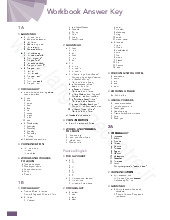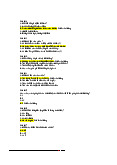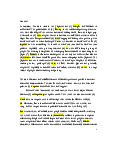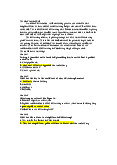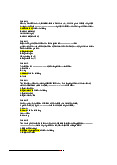




Preview text:
Meeting 11 SPEECH ACTS1 I. Act of Assertion
II. Descriptive Fallacy
III. Performative Utterances
IV. Constative Utterances I. SPEECH ACTS
Task 1. Answer the questions below:
1. Can you congratulate someone by a pat on the back, or a hug?
2. Can you congratulate someone by uttering "Well done"?
3. Can you bid at an auction by raising your hand?
4. Can you bid at an auction by saying "Eleven pounds"?
5. Can you promise someone something by a nod?
6. Can you promise someone something with an utterance beginning "I promise ... "?
Do you agree with the following statements?
1. Warning, shocking, complaining, apologizing, insulting, reassuring, etc. are all acts.
2. They are all things that we DO, using language.
_____________________________________________________________________
_____________________________________________________________________
A. ACT OF ASSERTION
Task 2. Answer the following questions.
1. When a speaker, in appropriate circumstances, makes an utterance containing a referring
expression, does he carry out a certain act, an act of referring?
2. When someone says, "Simon is in the kitchen", does he to hi assert s hearer that in the real
world a situation exists in which a person named Simon is in a room identified by the referring expression the kitchen?
3. When someone says, “Simon is in the kitchen”, would his only purpose be to a describe
particular state of affairs, and nothing more?
4. If Simon is a gluttonous cat, what do you think the purpose the speaker may have in
uttering “Simon is in the kitchen"?
5. If Simon is a 3 year-old boy, what do you think the purpose his mother may have in
whispering to his father “Simon is in the kitchen"?
6. If Jim is speaking ill of Simon, what do you think the purpose Fred may have had in
mind when telling Jim “Simon is in the kitchen”?
1 All the tasks in this handout are taken from Semantics – A course book (Hurford et al., 2007) 1
So, complete the definitions with the given phrases: a. an ACT of ASSERTION b. the DESCRIPTIVE FALLACY
i. When a speaker utters a declarative sentence (which can be either true or false), and
undertakes a certain responsibility, or commitment, to the hearer, that a particular
state of affairs, or situation, exists in the world, he carries out
ii. The view that the sole purpose of making assertions is to DESCRIBE some state of affairs is
Task 3. Would the main purpose of making the following assertions normally be simply to
describe some existing state of affairs in the world?
1. "There is a wasp in your left ear" Yes / No
2. "Someone has broken the space-bar on my typewriter" Yes / No 3. "This gun is loaded" Yes / No 4. "You are a fool" Yes / No 5. "I love you" Yes / No Task 4. For
each of the above five utterances state one or two purposes that the speaker may
have had in mind when uttering them. As a guide, we have done the first one for you.
1. To warn the hearer of the danger of being stung or to shock him. 2. 3. 4. 5.
Do you agree with the following statements?
1. An important part of the meaning of utterances is what speakers DO by uttering them.
2. Acts such as teasing, insulting, complaining, reassuring etc. are aspects of utterance
meaning and not of sentence meaning.
Task 5. Take a sentence such as There's a piece of fish on the table.
1. Could this sentence be uttered as a means of complaining to a waiter in a restaurant that
a table had not been cleared properly?
2. Could it, in other circumstances, be uttered to warn one's husband or wife not to let the cat in the kitchen?
3. Could it, in still other circumstances, be uttered to reassure one's husband or wife that
his or her lunch has not been forgotten? 2
4. Could it, in a different situation, be used to incriminate a child who had raided the refrigerator?
5. Are individual sentences generally identifiable with single specific acts that are carried out by uttering them?
B. PERFORMATIVE UTTERANCES & CONSTATIVE UTTERARANCES
We have established the basic point that assertive utterances do not merely describe some state
of affairs, but also carry out acts. This is the distinction between performative utterances (and
sentences) and constative utterances (and sentences). Task 6. 1.
If I say to you, "I warn you not to come any closer", do I, by so saying, actually perform the
act of warning you not to come any closer? 2.
Does the utterance "I warn you not to come any closer" describe an act of warning by the speaker? 3.
Is the utterance "I warn you not to come any closer" a performative utterance? 4.
If Sam says to Rachel, "I admit that I took 50p from the coffee money" does he, by so
saying, actually perform the act of admitting that he took the money? 5.
And does Sam's utterance describe an act of admission? 6.
Is "I admit that I took 50p from the coffee money" performative? 7.
If someone says, "I'm trying to get this box open with a screwdriver", does that utterance
itself constitute an act of trying to open a box with a screwdriver? 8.
Is "I'm trying to get this box open with a screwdriver" performative?
_______________________________ is one that actually describes the act that it
performs, i.e. it PERFORMS some act and SIMULTANEOUSLY DESCRIBES that act.
_______________________________ is one which makes an ASSERTION (i.e. it is
often the utterance of a declarative sentence) but is NOT performative.
Which of the following sentences is performative? Which is constative?
a. "I promise to repay you tomorrow"
b. “I am removing the cobwebs from the ceiling with a long-handled mop”
Task 7. Are the following utterances performative (P) or constative (C)? 1. "I name this ship Hibernia"
2. "I believe in the dictatorship of the Proletariat" 3. "I admit I was hasty" 4. "I think I was wrong"
5. "I hereby inform you that you are sacked" 3
6. "I give you supper every night"
A PERFORMATIVE VERB is one which, when used in a simple positive present
tense sentence, with a 1st person singular subject, can make the utterance of that sentence performative. Examples: -
Pronounce is a performative verb because, for example, "I pronounce you man and wife" is a performative utterance. -
Sentence is a performative verb because, for example, "I sentence you to be hanged by the
neck" is a performative utterance. -
Punish is not a performative verb because, for example, "I punish you" is not a performative utterance.
Task 8. Are the following performative verbs, or not? 1. apologize Yes / No 2. authorize Yes / No 3. argue Yes / No 4. condemn Yes / No 5. squeal Yes / No
As noted above, performative utterances contain a performative verb, and many have
1st person singular subjects and are in the present tense. But there are exceptions to this pattern
Task 9. Some of the following utterances are exceptions to the statement that all performative
utterances have 1st person singular subjects. Which utterances are the exceptions?
1. "You are hereby forbidden to leave this room"
2. "All passengers on flight number forty-seven are requested to proceed to gate ten"
3. "I suggest that you see a psychiatrist as soon as possible"
4. "This ship is called Titanic"
5. "We thank you for the compliment you have paid us"
The most reliable test to determine whether an utterance is performative is to insert the
word hereby and see if the modified utterance is acceptable.
Task 10. Can hereby be acceptably inserted in the space indicated in the following utterances? 4 1. "I (
) give notice that I will lock these doors in sixty seconds" cases 2. "Listeners are (
) reminded that BBC wireless licenses expire on April 4th" 3. "It (
) gives me great pleasure to open this building" 4. "I (
) warn you not to talk to my sister again" 5. "I (
) believe in God the Father Almighty, Creator of Heaven and Earth"
If a sentence can be accompanied by hereby without seeming odd, then the utterance of that
sentence (in normal circumstances) constitutes a performative utterance.
Task 11 Indicate whether the following sentences are odd or not odd. .
1. I hereby warn you that you will fail
2. They hereby warn her that she will fail
3. I hereby promised him that I would be at the station at three o'clock
4. The management hereby warn customers that mistakes in change cannot be rectified once
the customer has left the counter.
5. Spitting is hereby forbidden 6. I hereby sing 5
